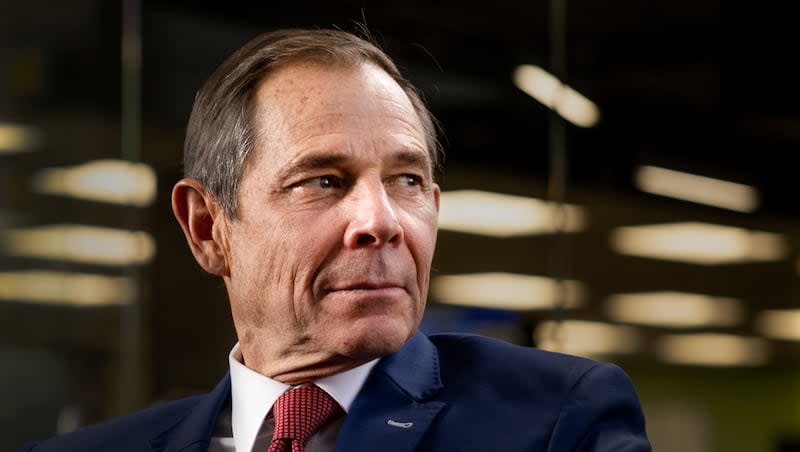It’s not a TikTok ban, Rep. John Curtis says

Rep. John Curtis said the bipartisan bill requiring TikTok to divest from its parent company, ByteDance, is not a ban on the app.
Curtis spoke to the Deseret News on the phone Friday about a bill advanced from the U.S. House Energy and Commerce Committee. The legislation stipulates that TikTok needs to be sold from ByteDance within a six-month time frame or else it’ll be removed from the app store.
“This is a very limited scope and very targeted,” Curtis said, adding that it wasn’t typical for legislation to pass out of committee unanimously. He emphasized that politicians on both sides of the aisle have indicated their support of the bill.
In a statement issued to the Deseret News on Thursday, TikTok said “this legislation has a predetermined outcome: a total ban of TikTok in the United States.”
Curtis said that’s not the case and described the social media app’s response to the legislation as “disingenuous.” He’s not on TikTok, but he does use other social media apps and he said he recognizes “there’s a lot of good that comes from social media.”
“It’s not a ban. It’s simply an unwillingness to let the Chinese government be in control of this,” Curtis said, saying the impetus for the legislation is national security concerns, not an attempt to cut back on freedom of expression. “We’re not saying anything about free speech.”
The national security concerns stem from data collection and how algorithms could be used to manipulation behavior.
Pertaining to data collection, Curtis spoke about a notice some users have received on the TikTok app. The notice asked users to input their zip code to call their congressional representative. The Deseret News confirmed the notices were sent via notifications.
Curtis took issue with it. “That’s fine if that is a private entity, but it’s not acceptable if it is a foreign entity,” Curtis said.
Entering zip codes to call a congressional representative wasn’t Curtis’ only data concern — he said he had broader concerns about the app having the ability to collect geographical data.
According to TikTok’s website, when a user has location services turned on for TikTok in their phone’s settings, then TikTok “will receive your approximate location from your device’s GPS data.” If location services are turned off, then “TikTok will continue to collect your approximate location information based on your device or network information, such as SIM card and IP address.”
Where data collection and algorithms meet is a cause for Curtis. “Those who understand algorithms understand that with AI and enough data that they have the ability to manipulate behaviors and we see that it’s a huge problems for very young teens or kids using these apps,” Curtis said.
Curtis said he and other members of Congress do not want the Chinese Communist Party to have the ability to influence the outcome of a U.S. election.
During a House Energy and Commerce Committee hearing in 2023, Curtis asked TikTok CEO Shou Chew if it was possible that TikTok could use artificial intelligence and algorithms to change who would see a policy issue. Chew responded “The way we look at it is our users come in and express whatever view they want.”
This isn’t the first time the U.S. government has considered or requested that an app divest from its parent company. The Committee on Foreign Investment in the U.S. told Beijing Kunlun Tech that its ownership of an online dating app sparked national security concerns. It was sold to a California-based group.
Curtis also brought up other issues he sees with TikTok such as its potentially negative impact on teen mental health. “If you simply talk about the mental health issues, this bill is a tiny step forward,” he said.
“I applaud the state of Utah’s efforts to try to reign this in. I think the lawmakers in Utah are seeing the same things that we’re seeing with mental health,” Curtis said. He explained that while he has concerns about how the app impacts adults, he has much more serious concerns about how it impacts children.
Utah has been at the forefront of states aiming to protect children from potential harms of social media. After passing the Social Media Regulation Act in 2023, the state amended its social media laws during the 2024 legislative session.
Curtis added that he hopes people will be more careful with sharing their data online as a result of this latest House bill highlighting the issue.
“We’re not trying to take decisions away from people,” Curtis said. “But I personally hope they really understand the consequences of their decisions — particularly parents with children.”

